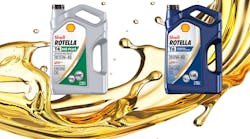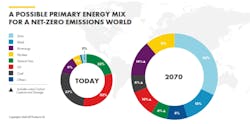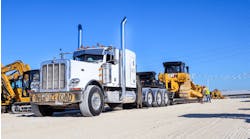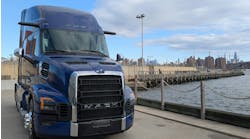COLLEGE STATION, TX— The modern fleet is supposed to be all about the right tool, or rather an engine, for the job. The fuel source for one application may not be the best one for another, so one base of operations may have some pickups that run on gas, while most of the bigger truck engines most likely require diesel. And increasingly, fleets may even move toward natural gas vehicles (NGVs), as the abundant energy source generates far fewer greenhouse gas emissions than its crude cousins.
This has already enticed Total Transportation Services Inc. (TTSI), which is testing the Cummins Westport ISX12N Natural Gas engine in 20 Volvo and 20 Freightliner Class 8 trucks at the ports of Los Angeles and Long Beach. Using renewable natural gas, these trucks could cut their emissions by 80%, and up to 90% with compressed natural gas, according to the nonprofit Coalition for Clean Air (CCA). Overall, there are around 1750,000 NGVs in the U.S. and 23 million worldwide, according to NGV America.
Strategically using all three, and someday even battery-electric and hydrogen fuel cell vehicles, is a fine way to shrink a company’s carbon footprint, but not so much for reducing complexity in the shop. A shop may have to contend with three separate fuel sources—and the specific motor oils that go along with that. Aside from the tanks taking up a lot of space, the technician must be extra wary of putting the wrong oil in the wrong engine.
To alleviate this issue, Shell Lubricants has developed Shell Rotella T4 NG Plus 15W-40 heavy-duty engine oil, which was formulated to stand up to the high temperatures and pressure ranges of a natural gas engine, but also works in gasoline and diesel engines as well, and for several engines.
The T4 will be available in December and is approved for:
- API CK-4
- API SN
- Cummins CES 20092 (replacing CES 20085 which becomes obsolete December 31, 2019)
- Cummins CES 20086
- Detroit Diesel DFS 93K222
- Mack EO-S 4.5
- Volvo VDS-4.5
According to Shell, key benefits include:
- Long and efficient operation due to a formula that balances detergent and dispersancy to keep pistons and engine cleaner
- Longer valves and spark plug life due to additives that control the deposit formulation in the combustion chamber
- Lower ash formulation to protect exhaust catalysts and particulate filters found on the latest low emission vehicles
The new oil also increases the maintenance intervals for oil changes, helping with uptime.
“Along with the improved nitration and oxidation control, you can go long drain intervals with it, up to two times longer in some applications,” said Dan Arcy, Shell global OEM technical manager, who spoke to member so of the media at Shell’s Collaborative Thinking to Power Fleets of Tomorrow event on Nov. 14.
That is for a bus that went from 500 hours of service to 1,000, Arcy explained. For on-highway, users can see a 60% improvement, from 25,000 to 40,000 miles. This depends of course on the load and application.
One case where you may want to keep a lower viscosity option for non-NGVs is if fuel economy matters more than simplifying your SKUs.
“If you’re looking for optimizing for the best fuel economy, 10W-30 is going to be a better product to use in diesel engines,” Arcy said.
More often than not, fleets value only worrying about one oil, though, because that reduces the chance for the wrong oil used in the wrong engine, Arcy said.
For Shell, this move isn’t only to help fleets now but to prepare for the future.
“This product really came about because we knew there some changes in the industry,” said Arcy, who had previously stated that natural gas reserves “could last another 230 years.”
This chart explains what those changes will look like in the next 50 years, and how diverse energy as a whole will look.
Arcy also introduced Shell Rotella T6 Full Synthetic 0W-40 heavy-duty engine oil, a low-viscosity solution for both on-road and off-road vehicles in cold weather. It’s best for applications calling for API CK-4 engine oil, and it too uses a low ash formula to be more gentle on the exhaust catalysts and particulate filters.
The T6 Full Synthetic 0W-40 is approved for:
- API CK-4, CJ-4
- Caterpillar ECF-3, ECF-2, ECF-1A
- Cummins CES 2008
- Ford WSS-M2C171-F1
- Mack EO-S 4.5
- Volvo VDS-4.5, VDS-4
Arcy mentioned switching to the 0W-40 from a 15W-40 in the winter and back again in the spring would not be a problem.





